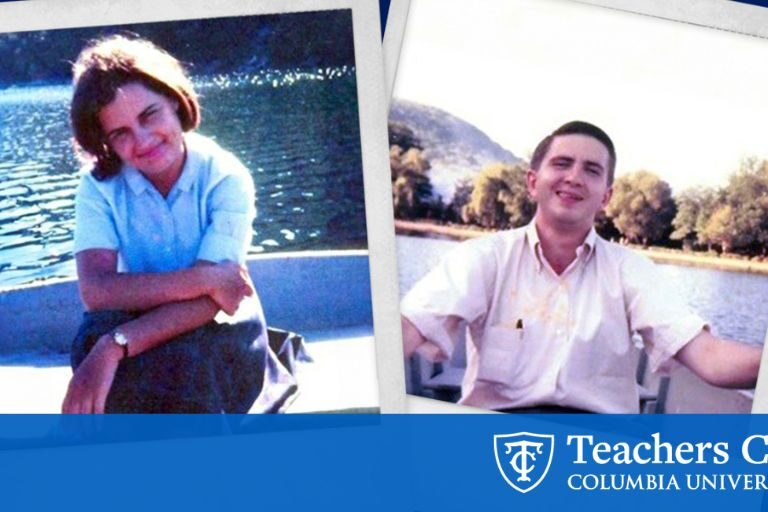The story is classic, yet remarkable. Two doctoral students meet (as fate would have it, at Teachers College) and begin dating. But their respective ambitions — involving school psychology and psychological measurement — led them down different paths, accomplishing their dreams separately before reuniting many years later.
Such is the love story of Ann Boehm (Ph.D. ’66) and her husband Gary Robertson (Ph.D. ’67), who will celebrate a decade together this fall — 60 years after first dating in 1964.
“We speak the same language. We understand each other,” says Boehm, Professor Emerita of Psychology and Education, who taught at the College for more than three decades. “We go back a long time.”
New York in the ’60s for Boehm and Robertson included concerts, plays, and trips to the movies. But each scholar was “immersed” in their own goals. Boehm developed the Boehm Test of Basic Concepts as part of her doctoral dissertation, later publishing it and watching it grow to widespread use and critical acclaim as she built a life in New York. Robertson embarked on a career in test development, first in New York and then later in Minnesota. Throughout his career, he managed the test development and publication for three test publishers and co-authored the two most recent editions of the Wide Range Achievement Test, which has been used widely in testing basic academic skills for individuals ages five through ninety.
President Thomas Bailey, Ann Boehm and Gary Robertson in Tampa, Fla. in March 2024.
“We lost track of one another,” explains Robertson over the phone from his and Boehm’s home in Florida. “Looking back on it, we can’t think of a good reason.”
After concluding their studies at Teachers College, both Robertson and Boehm would go on to marry other people, but both stayed connected to TC in different ways. Robertson lived in the neighborhood for a few years after graduate school. Boehm returned to TC as a member of the school psychology faculty. Both supported the College diligently, each becoming members of the Grace Dodge Society, a special group of individuals who have included TC in their wills, trusts or other planned gifts. Supporting the College consistently for 30 years, Robertson is also a long-standing member of the Maxine Greene Society, which recognizes those who have given to TC three or more years, consecutively. Boehm, to honor her late husband Neville in 2014, established a fund to provide scholarships for doctoral students in school psychology.
It was around that time that Robertson, himself now also a widower, took a leap of faith and reached out to Boehm in hope that they could reconnect during the Grace Dodge Society’s annual luncheon. He emailed Boehm, but concerned he didn’t have the right address, also followed up with a letter as a “fail-safe measure.” Fortunately, the letter made it into her mailbox.
Ten years later, Robertson and Boehm have built a life together in Florida — spending time with their cherished dogs, perfecting their favorite recipes, working out together and enjoying walks around the scenic routes of their neighborhood. The two have recently made a significant planned gift for the College that will create a future endowed associate professorship in the School Psychology program, with an emphasis on early childhood, as well as a doctoral fellowship in the Measurement, Evaluation, and Statistics program.
Ironically, their shared passion for testing’s value in education and elsewhere — once a challenge to take on separately — now feels intertwined. The couple — both now in their 80s — still deeply contemplate the challenges and opportunities associated with the use and interpretation of standardized tests in various settings, such as, for example, educational, psychological, clinical, counseling and employment. It’s at the core of why they chose to entwine their legacy with Teachers College through this planned gift.
“Testing in elementary and secondary education has to be seen in a more positive way that can inform instruction and intervention, and help parents and teachers foster their children’s needs in a positive way,” explains Boehm, a Distinguished Alumni Award honoree.
Boehm and President Bailey at the presentation of her Distinguished Alumni Award in 2023. (Photo: Bruce Gilbert)
For Boehm and Robertson, that’s precisely what educational testing is meant to do: illuminate what students need more help with so teachers and other specialists can respond accordingly. In its purest form, it’s not meant to serve as a litmus test of teacher efficacy or success — both Boehm and Robertson adamantly attest.
“Teachers have a really challenging job,” says Boehm, referencing the competing needs of students, parents and educators alike. “And that’s where Teachers College can make such an important difference in the future by connecting these strands.”
Robertson sees the development of specially designed support materials as key to helping not only teachers and educators but also professional test users in other settings grasp the fundamental principles of proper standardized test use and interpretation.
For Robertson, TC’s impact is immeasurable. “It changed the course of my life, and the way I think about so many things,” he says, as he sits next to Boehm, as fate would have it.
Published Thursday, Oct 3, 2024

